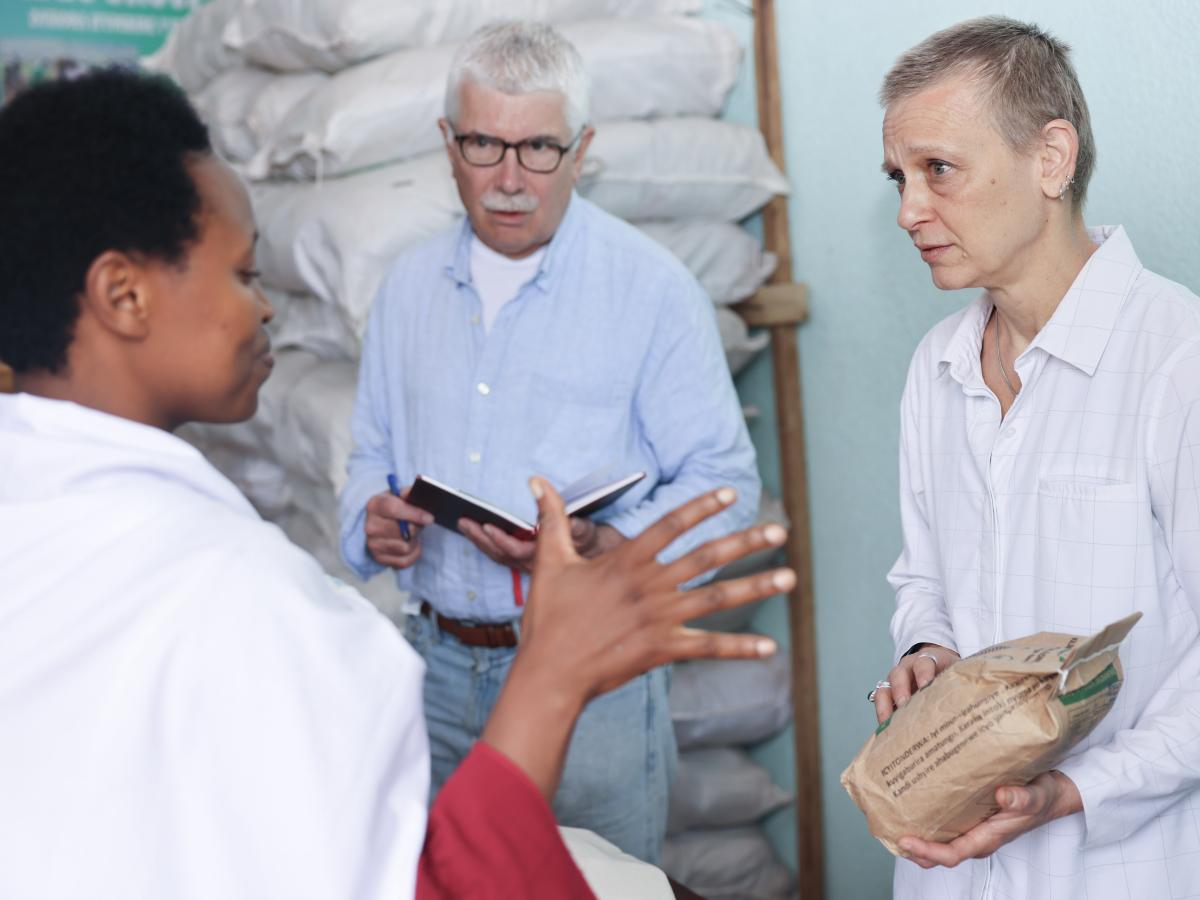Quality Seeds and Sustainable Practices for Rwandan Farmers
"Life was tough," Valentine starts her story. "We barely had enough to eat, and I struggled to provide for my children’s education and medical needs." With three little children, ensuring a steady food supply was a daily struggle.
Valentine lives in a village nestled among the beautiful hills of Rurindo. The land offers immense opportunities here, but farmers lack good seeds and use outdated techniques, resulting in hard work, little food and lots of waste. Climate change is making things even harder for farmers. The unpredictable weather patterns, soil degradation, and economic hardships, as outlined by the 2023 World Food Program report, force farmers to rely on staple crops like maize and beans, and often leave families vulnerable to malnutrition and economic instability.
Valentine remembers when her first child suffered from malnutrition because they didn’t have enough food. “Jean Claude was about one and a half years old. I didn’t know how to keep him healthy because we didn't have enough to eat,” she says. Her husband and Valentine worked hard in the fields, but the gains were dwindling.
When a project came to offer better seeds and support for farmers, Valentine was among the first in her village to embrace the help and try something different. The Great Lakes Accelerated Innovation Delivery Initiative Rapid Delivery Hub, a project led by the International Institute of Tropical Agriculture (IITA) and funded by Feed the Future, was designed to deliver more food, fast. The interventions focus on food security through the rapid adoption of proven agricultural technologies and innovations.
Once Valentine had improved seeds and fertilizers, she started learning about modern and sustainable farming practices. To make sure Valentine can continue growing more food, the project connected her to local seed companies and agro-dealers, including Seeds of Trust Ltd and Kilimo General Business.
This approach of linking farmers with high-quality seeds and fertilizers, combined with the technical training, has been pivotal in transforming farming operations for hundreds of farmers in Rwanda.
"Getting access to quality seeds and learning how to better manage my land has changed everything," says Valentine. She learned theory from the experts and got practical experience from the demonstration plots which serve as learning hubs where farmers can see firsthand the impact of using improved seeds and fertilizers, and test out sustainable practices.

Josette Twizere, a local agro-dealer from Kanzenze sector, shares how quality seeds have revolutionized Rurindo's agricultural landscape, highlighting the transformative impact on her household through this thriving business.
Photo by Martin Tindiwensi, Communication Specialist, USAID Rwanda
"I used to grow food that was not even enough to feed my family, but now I can harvest 800 kg of beans," she proudly says, showing her harvest. Valentine sells half of her produce and keeps the rest to feed her family. Now, they have enough food all year round.
Valentine and other farmers are making a significant positive change in the region's food security. By focusing on both the supply chain, linking seed producers and agro-dealers to farmers, and providing practical, hands-on training, this project is helping farmers secure their livelihoods and improve their families' nutrition.
Valentine’s success is just one story among many. The project operates across several districts in Rwanda, targeting areas like Rurindo that are affected by malnutrition and food insecurity.
The project’s partnerships extend to multiple stakeholders, including Catholic Relief Services (CRS), One Acre Fund, and the Rwanda Agriculture and Animal Resources Development Board (RAB). These collaborations are crucial in scaling the delivery of agricultural innovations and enhancing the capacity of local farmers to adopt sustainable practices. By providing farmers with training to improve their skills and resources, the project promotes the use of quality seeds and best agronomic practices. This includes pest management, fertilizer application (mineral and organic), and postharvest management techniques, which are critical to boosting production.
Crops are growing more abundant and healthier thanks to the improved seeds, fertilizers and techniques. One of the local agro-dealers involved in the project in the Kanzenze sector, Josette Twizere, speaks proudly of their achievements. "Providing quality seeds to farmers has not only increased their yields but also improved the overall agricultural landscape in Rurindo. We see healthier crops and more resilient farmers."
She says that the agro-dealing business has helped support her family and created jobs for the youth in the area. "Unloading and loading the agro-products and transporting them to farmers have provided jobs for the youth in this area," she said. With 33% of youth in Rwanda not involved in school or employed, interventions like these matter on a larger scale.
Valentine’s story is a powerful reminder of how targeted interventions can transform lives. "Before the project, feeding my family was a daily struggle," she reflects. "Now, we have enough to eat and even some to sell. My children are healthier and happier, and I can afford their school fees."
With continued support from the United States and partners, the future looks bright for farmers in Rurindo and beyond. With the right tools and support, even the most vulnerable communities can build a more secure and prosperous future.
AID-I is a regional project funded by Feed the Future and implemented by International institute for Tropical Agriculture (IITA) and partners.
To learn more about the approach this project takes to ensure thank modern farming practices take root in Rwanda, please reach out to icyiza@usaid.gov.
Explore what else USAID is doing to support economic growth in Rwanda by visiting our Economic Growth page.

